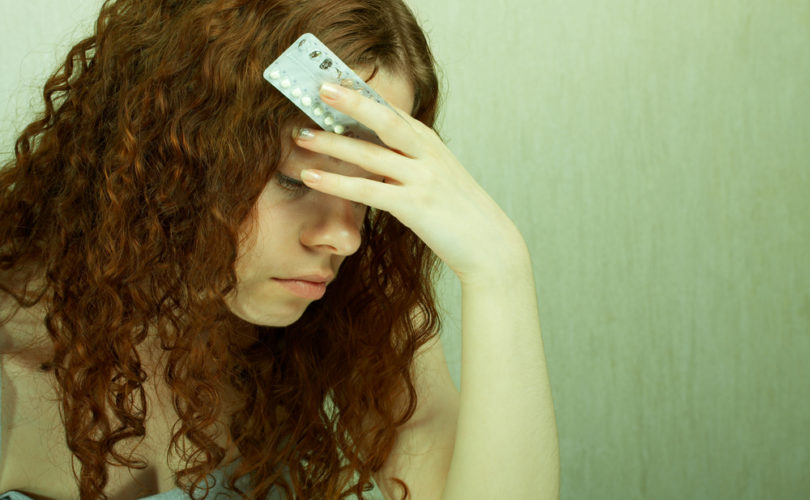NEW YORK, October 17, 2016 (LifeSiteNews) — Oral contraception literally turned a 25-year-old “bubbly, blushing bride” into a zombie-like person who told her newlywed husband, “I don’t want to live anymore. I want to take my life.”
“I was a happy newlywed,” Michelle, now 37, explains, but after she was prescribed estrogen- and progestogen-based birth control pills to control cramping, “I soon became suicidal.”
“I was very depressed and didn’t want to get out of bed,” Michelle told the New York Post for an article headlined Birth Control is Turning Women into Hormonal Messes. “My husband would come home from work and find me staring blankly at the TV in the dark. It was frightening.”
At one point, Michelle’s newlywed husband broke down the bathroom door to get to her, as she crouched in a fetal position in the corner of the tub with the water running all over her.
Studies have found that oral contraceptives cause depression in women. Danish researchers who studied the medical records of more than one million women found that some forms of contraception doubled women’s rate of depression – and tripled the chances of teenage girls being prescribed antidepressants.
“We have to realize … external hormones may have side effects, and the risk of depression is one of them,” said the study’s co-author, Dr. Øjvind Lidegaard, professor in obstetrics and gynecology at the University of Copenhagen.
The Post notes several women’s tragic stories of crippling depression caused by birth control pills.
Andrea of New Jersey shared her severe emotional distress just two months after starting a different oral contraceptive. “My normal insecurities were exacerbated,” she explained. “Crying and screaming, I opened the [bedroom] door and literally threw a glass dish full of coins at him when he was sleeping. … I couldn’t stop myself. I still remember the feeling — I felt desperate. It was so insane.”
Dr. Lidegaard’s major study of a million women also found that those on hormonal intrauterine devices (IUDs) have triple the risk of severe depression.
The Post story also featured Yoshi, a new mother whose IUD caused her “terrible, extremely painful” sessions, “insane anxiety, and increased panic,” and sensory sensitivity.
Yoshi’s own baby “trigger(ed) feelings of being overwhelmed.” She described her ordeal in frightening terms, as the effects of her IUD literally drove a wedge between her and her child: “His cry felt like a knife to the center of my brain,” she said.
Yoshi says getting rid of the IUD saved her sanity.
Now Yoshi advises women, “Trust your gut. If something doesn’t feel right, listen to your body. Just because a doctor says certain side effects ‘can’t’ exist doesn’t mean it isn’t very real.”
“The only real surprise about this story is that it is a surprise to some people,” Dr. Brian Clowes, Human Life International’s director of research and training, told LifeSiteNews. “The Food and Drug Administration requires the manufacturers of all hormonal methods of birth control — not just oral ‘contraceptives’— to include in each package ‘Warnings and Precautions’ stating that women with a history of depression who are using these products must be ‘carefully observed’ in case their depression worsens.”
Additionally, “these warnings also list ‘depression’ under ‘serious adverse reactions,’” Dr. Clowes explained, noting that this warning of the risk of depression is for all hormonal contraception, including “all of the more than 200 types of birth control pill.”
“It is also no surprise that many prescribers remove this legally-required warning pamphlet from the pill packages,” Clowes said. “What is a surprise is that feminist and other allegedly ‘pro-woman’ groups are not shouting from the rooftops details of the more than sixty adverse side effects that these pills have.”
“I guess concern for women’s health only goes so far.”

